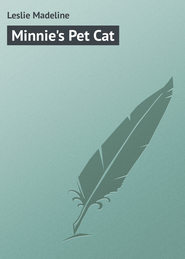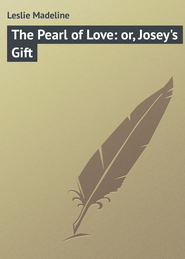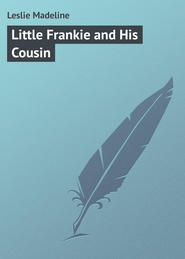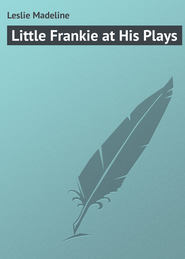По всем вопросам обращайтесь на: info@litportal.ru
(©) 2003-2025.
✖
Minnie's Pet Dog
Настройки чтения
Размер шрифта
Высота строк
Поля
Minnie's Pet Dog
Madeline Leslie
Leslie Madeline
Minnie's Pet Dog
TO MY YOUNG FRIEND, HENRY FOWLE DURANT, JR
These Little Volumes
ARE AFFECTIONATELY INSCRIBED
BY THE AUTHOR, IN THE EARNEST HOPE THAT THEY MAY INCREASE IN HIM THAT LOVE OF NATURE AND OF RURAL LIFE WHICH HAS EVER EXERTED SO SALUTARY AN INFLUENCE IN THE FORMATION OF THE CHARACTERS OF THE WISE AND GOOD
CHAPTER I.
TINEY AND LEO
I have given an account of Minnie’s pet parrot, and of Minnie’s pet cat. In this volume I shall give the reader an account of her pet dog, Tiney, with anecdotes of other dogs.
Tiney was a spaniel. He had long, pendent ears, black, expressive eyes, a short, well-rounded mouth, and long, silky hair. He was an affectionate little fellow, who attached himself to every body in the house. He was on the most friendly terms with Fidelle, often eating sociably with her from the same plate. In summer, when Minnie liked to play on the lawn, Tiney might be seen running here and there in obedience to his young mistress, picking up a ball or stick, and bringing it to her in his teeth.
If the truth must be told, Tiney was a dog that loved his own ease. In the winter he liked to lie on the hearth rug in front of the glowing fire, one eye partly open, to be sure that Fidelle, who was fond of playing with his tail, committed no indignities with it.
Sometimes Minnie used to get out of patience with him for being so sleepy; but her mother told her it was in consequence of his eating so heartily, and taking no more exercise; and then the little girl would drag him off out of doors, often sadly against his will, and entice him into a frolic.
It was curious to see Tiney with Leo. The spaniel held the great dog in awe, and never but once was known to go to the stable to see him.
The circumstances that led to this visit were very curious, and I must relate them.
When Tiney first saw Leo, he was only a puppy, and I suppose was frightened at the sight of so large a dog. He began to bark at him with all his might. Mr. Lee wished to have them become friends; but this did not appear so easy, for Leo, after looking disdainfully at the pup, walked away with great dignity.
After this, whenever Tiney saw him, he began to bark, or rather to growl; but Leo never took the least notice of him.
Tiney, however, was fond of running to the gate to see what dogs were passing by. In this way, he formed many acquaintances, and some very bad ones.
An express-man used to pass the house two or three times a week, and was always accompanied by a large mastiff, a savage-looking dog, with a deep bass voice.
One day, when the express-man’s wagon was going by, Tiney began to jump up before the horses’ mouths and bark. The man spoke to the mastiff, who at once flew at the spaniel, and shook him thoroughly.
Tiney cried out piteously, and walked back to the house a sadder if not a wiser dog.
But he did not forget. On the day when the express-man passed again, he paid the visit, I have mentioned, to Leo, and in some way made him understand that he wanted to engage his services.
Leo agreed to revenge the insult that had been offered the little fellow. When the mastiff came by, they were ready for him. Tiney did the barking, while his defender caught the mastiff, and whipped him severely.
Leo and Tiney then returned to the house together, when the spaniel showed his gratitude by running back and forth before his friend, and giving several short barks. But what was most remarkable was the fact, that after this they returned to their old footing, Leo never condescending to take any notice of his smaller companion, and Tiney giving an occasional growl when he saw him approach.
When Minnie was in her eighth year, her parents went on a journey into a distant state, and she accompanied them; but though she pleaded to take Tiney with her, it was not allowed.
The next summer preparations were made for another journey, and there was much conversation about it in the family circle.
One morning, when they were discussing the time of their being absent, Mrs. Lee noticed that Tiney appeared very uneasy. He jumped repeatedly into her lap, and from that to the floor, rubbing his sides against her feet.
“What can Tiney want?” she said aloud. “I’m sure he is trying to make me understand something.”
“O, I wish he could go!” cried Minnie. “You know how sad he was when we were gone before.”
The spaniel, on hearing these words, gave a joyful bark, moving his tail back and forth in an excited manner, and then looked wishfully in her face.
“He seems to understand what we say,” the lady went on, glancing with some surprise at her husband.
“I have no doubt of it,” he answered, smiling. “Here, Tiney! here, sir!”
The dog obeyed.
“Do you know, Tiney,” he asked, “that we are going away?”
No reply.
“Would you like to go with us in the carriage?”
Tiney gave a short, quick bark.
“I’m afraid that would not do,” added the gentleman, shaking his head. “I fear you would be too much trouble.”
No more was said, and the dog went across the room, his tail hanging between his legs, and remained quietly on the corner of the sofa. They noticed that he watched every movement closely, and that, if Minnie left the room, he seemed uneasy till she returned.
“It is very strange that he can understand,” remarked Mrs. Lee. “See, he is not asleep, though he pretends to be; he is listening to what we say.”
Minnie laughed aloud. “It is too funny!” she exclaimed.
“I have heard of many cases,” remarked her father, “where it was evident that dogs understood well certain words uttered in their presence.”
“O, father,” urged Minnie, “do please tell them to me.”
He looked at his watch, and then began: —
“A gentleman by the name of Taylor was once travelling in Spain. He arrived early one evening at a village inn, and sat down before a stove to dry his boots. Close by him was a dog, which watched him very attentively.
“What can you give me for supper?” the gentleman inquired of the hostess.
“‘Some eggs,’ was the reply.
“‘No; they are too mawkish.’
“‘A rabbit?’
“‘That is too indigestible.’
Madeline Leslie
Leslie Madeline
Minnie's Pet Dog
TO MY YOUNG FRIEND, HENRY FOWLE DURANT, JR
These Little Volumes
ARE AFFECTIONATELY INSCRIBED
BY THE AUTHOR, IN THE EARNEST HOPE THAT THEY MAY INCREASE IN HIM THAT LOVE OF NATURE AND OF RURAL LIFE WHICH HAS EVER EXERTED SO SALUTARY AN INFLUENCE IN THE FORMATION OF THE CHARACTERS OF THE WISE AND GOOD
CHAPTER I.
TINEY AND LEO
I have given an account of Minnie’s pet parrot, and of Minnie’s pet cat. In this volume I shall give the reader an account of her pet dog, Tiney, with anecdotes of other dogs.
Tiney was a spaniel. He had long, pendent ears, black, expressive eyes, a short, well-rounded mouth, and long, silky hair. He was an affectionate little fellow, who attached himself to every body in the house. He was on the most friendly terms with Fidelle, often eating sociably with her from the same plate. In summer, when Minnie liked to play on the lawn, Tiney might be seen running here and there in obedience to his young mistress, picking up a ball or stick, and bringing it to her in his teeth.
If the truth must be told, Tiney was a dog that loved his own ease. In the winter he liked to lie on the hearth rug in front of the glowing fire, one eye partly open, to be sure that Fidelle, who was fond of playing with his tail, committed no indignities with it.
Sometimes Minnie used to get out of patience with him for being so sleepy; but her mother told her it was in consequence of his eating so heartily, and taking no more exercise; and then the little girl would drag him off out of doors, often sadly against his will, and entice him into a frolic.
It was curious to see Tiney with Leo. The spaniel held the great dog in awe, and never but once was known to go to the stable to see him.
The circumstances that led to this visit were very curious, and I must relate them.
When Tiney first saw Leo, he was only a puppy, and I suppose was frightened at the sight of so large a dog. He began to bark at him with all his might. Mr. Lee wished to have them become friends; but this did not appear so easy, for Leo, after looking disdainfully at the pup, walked away with great dignity.
After this, whenever Tiney saw him, he began to bark, or rather to growl; but Leo never took the least notice of him.
Tiney, however, was fond of running to the gate to see what dogs were passing by. In this way, he formed many acquaintances, and some very bad ones.
An express-man used to pass the house two or three times a week, and was always accompanied by a large mastiff, a savage-looking dog, with a deep bass voice.
One day, when the express-man’s wagon was going by, Tiney began to jump up before the horses’ mouths and bark. The man spoke to the mastiff, who at once flew at the spaniel, and shook him thoroughly.
Tiney cried out piteously, and walked back to the house a sadder if not a wiser dog.
But he did not forget. On the day when the express-man passed again, he paid the visit, I have mentioned, to Leo, and in some way made him understand that he wanted to engage his services.
Leo agreed to revenge the insult that had been offered the little fellow. When the mastiff came by, they were ready for him. Tiney did the barking, while his defender caught the mastiff, and whipped him severely.
Leo and Tiney then returned to the house together, when the spaniel showed his gratitude by running back and forth before his friend, and giving several short barks. But what was most remarkable was the fact, that after this they returned to their old footing, Leo never condescending to take any notice of his smaller companion, and Tiney giving an occasional growl when he saw him approach.
When Minnie was in her eighth year, her parents went on a journey into a distant state, and she accompanied them; but though she pleaded to take Tiney with her, it was not allowed.
The next summer preparations were made for another journey, and there was much conversation about it in the family circle.
One morning, when they were discussing the time of their being absent, Mrs. Lee noticed that Tiney appeared very uneasy. He jumped repeatedly into her lap, and from that to the floor, rubbing his sides against her feet.
“What can Tiney want?” she said aloud. “I’m sure he is trying to make me understand something.”
“O, I wish he could go!” cried Minnie. “You know how sad he was when we were gone before.”
The spaniel, on hearing these words, gave a joyful bark, moving his tail back and forth in an excited manner, and then looked wishfully in her face.
“He seems to understand what we say,” the lady went on, glancing with some surprise at her husband.
“I have no doubt of it,” he answered, smiling. “Here, Tiney! here, sir!”
The dog obeyed.
“Do you know, Tiney,” he asked, “that we are going away?”
No reply.
“Would you like to go with us in the carriage?”
Tiney gave a short, quick bark.
“I’m afraid that would not do,” added the gentleman, shaking his head. “I fear you would be too much trouble.”
No more was said, and the dog went across the room, his tail hanging between his legs, and remained quietly on the corner of the sofa. They noticed that he watched every movement closely, and that, if Minnie left the room, he seemed uneasy till she returned.
“It is very strange that he can understand,” remarked Mrs. Lee. “See, he is not asleep, though he pretends to be; he is listening to what we say.”
Minnie laughed aloud. “It is too funny!” she exclaimed.
“I have heard of many cases,” remarked her father, “where it was evident that dogs understood well certain words uttered in their presence.”
“O, father,” urged Minnie, “do please tell them to me.”
He looked at his watch, and then began: —
“A gentleman by the name of Taylor was once travelling in Spain. He arrived early one evening at a village inn, and sat down before a stove to dry his boots. Close by him was a dog, which watched him very attentively.
“What can you give me for supper?” the gentleman inquired of the hostess.
“‘Some eggs,’ was the reply.
“‘No; they are too mawkish.’
“‘A rabbit?’
“‘That is too indigestible.’











